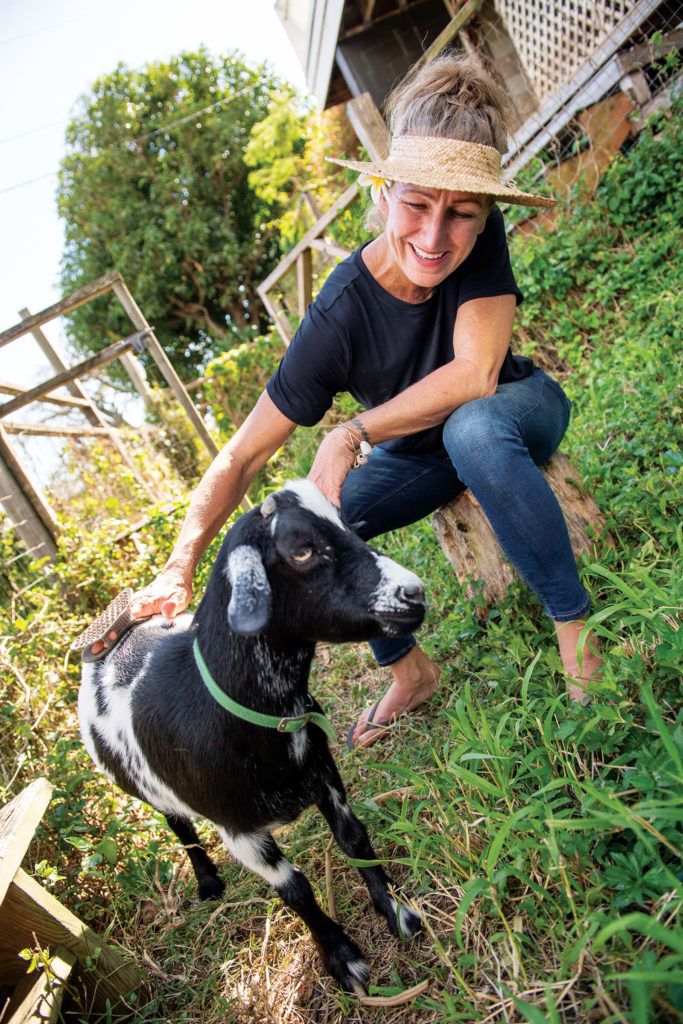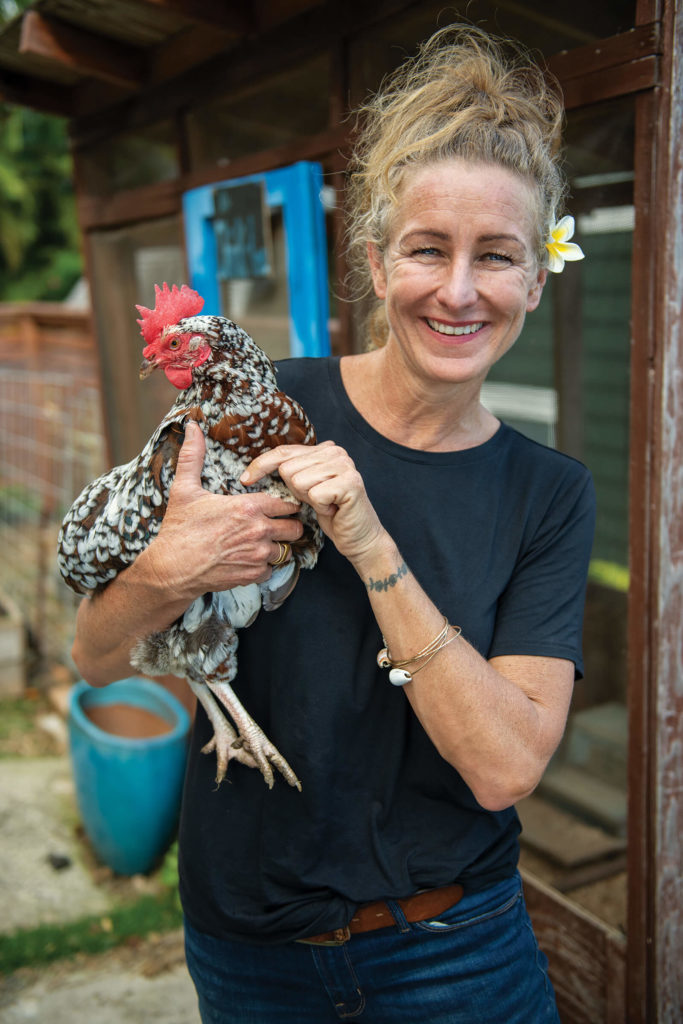
Eliza Leineweber ’92 Lathrop teaches students from kindergarten through the Academy not just how to garden and care for plants, but to connect in deeper ways to nature and Hawai‘i. As the School’s garden resource teacher, she works with students in outdoor classrooms and oversees a flourishing garden next to Griffiths Hall. She also runs the School’s beekeeping program, teaches American literature and hopes to develop an animal husbandry program on campus. At home, Lathrop maintains a robust vegetable and herb garden of her own. She also has six chickens, two dwarf dairy goats, an apiary with 40,000 bees and two dogs.
Tell us about the garden and farm at your home.
I built my house directly behind my parents’ house in Ma¯noa and created a little urban farm. In the garden, I grow kale, radishes, beans, a lot of herbs. I have tons of basil, as well as cilantro, parsley and sage. I have all the basic herbs. I also have lettuces, like arugula and spicy lettuce. I cook with all of them and pickle the vegetables.
I’ve always grown things and planted things, and when I went to Cornell, although I was getting my degree in American Studies, I took horticulture, botany, farm animal husbandry and farm construction in the ag school. I always had this little fantasy that I would run a dairy farm one day. Over the years, there has been lots of trial and error. That’s what I love about gardening is that you always get that chance to try again and learn from your mistakes. You probably learn more from your mistakes than you do your successes.
How did you learn how to care for farm animals?
Even when I lived in Virginia, I always kept chickens, way before everyone had chickens. This tipped me into animal husbandry and just thinking about animals beyond pets. I’ve always wanted to explore what role animals play in our everyday existence, and I started with the chickens, which led to bees. The best way to become a beekeeper is to find a beekeeper who’s willing to teach you, and Scott Nikaido (with the University of Hawai‘i Honeybee Project) became a valuable mentor when we started up the Punahou apiary. He walked us through all the issues that can happen in Hawai‘i with keeping bees.

Do your animals produce food for your family?
The bees produce honey and the chickens lay eggs. I’ve gotten an egg a day from each female for about three years. It’s probably one of the easiest ways to feed your family because you get plenty of eggs with two chickens for a family of four. The goats are Nigerian dwarf dairy goats. We brought them from Oregon, because we wanted to have a really good milking line, so they’re not just meat goats. They each produce eight cups of milk a day, four cups in the morning and four at night. When I get excess, I make cheese and yogurt and share it with friends and family.
What does cheese making entail?
For the cheese, I use different kinds of cultures based on what I’m making. Different cultures with time and temperature produce different styles of cheese. Most of the cheese making I’ve learned is through reading books and trial and error. I’ve also done a couple of internships with different cheese makers. Part of my recent sabbatical was spent on the farm of one of my really good friends. She’s an award-winning Virginia cheese maker. I spent a month helping her run a series of cheese camps for kids, teaching them about the sources of their food and how to make cheese. That’s what I’m hoping to be able to bring back to Punahou. I was also in Waldoboro, Maine, studying schools that have farm programs or animal husbandry, along with gardening, as part of their curriculum. It was fascinating to see how the kids connected to both the land, natural resources and food systems.
Punahou is considering having goats on Rocky Hill to eat the grass surrounding PV panels that might be installed there. Would you be involved with that project, teaching children how to care for the goats?
Yes, it would help them develop a connection with animals. If we can bring that to campus, it will help kids move beyond their own selves and think about their responsibilities, not just to the community of people, but to a broader community of land and resources. The whole magic of urban farming is having a chance on a daily basis to interact with your sources of food. I don’t think our kids have that opportunity very much.
It’s great that you found a personal passion that ties into your work at Punahou.
The garden is my joy, and I love sharing that joy with the kids. It’s unique that Punahou can offer them that opportunity, and I love that we do it in the Academy too. You can see these high school students relax and just open up in a really beautiful way when they’re in the garden.
